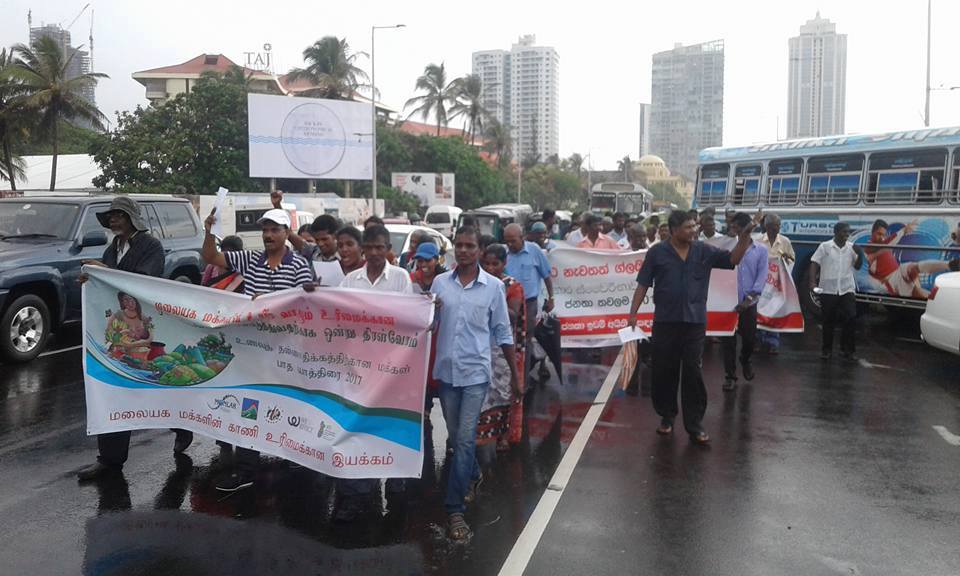Tea Plantation workers in Sri Lanka march for Food Sovereignty!

As part of the mobilisations to mark the International Day of Action for Peoples’ Food Sovereignty and against Transnational corporations, plantation communities in Sri Lanka has requested and demanded successive administrations to ensure that they have land rights, which is essential for dignified living. In this regard, Movement for Land and Agricultural Reform (MONLAR) and the people of the estates organised a People’s Caravan for Food Sovereignty from 8th to 13th October 2017. The caravan drew attention to a number of issues.
- Ensuring the rights to own land
It’s been 150 years since tea plantations were established in the country. A few months ago the country celebrated this landmark with great pageantry, however the estate sector workers who have shed blood, sweat and tears to ensure that the tea production goes on, still live like slaves, stuck in squalid rooms of 400 square feet. This practice has to end. These workers must be granted at least a plot of 20 perches, by a deed, so that they can build a house, to farm and to raise a cow.
- Stop the sale of properties that belong to estates
The government has commenced an initiative to sell the assets of Sri Lanka State Plantation Corporation (SLSPC), Elkaduwa Plantations and Janatha Estates Development Board (JEDB) cheaply and to close down the operations. Those who depended on work provided by these estates will soon lose their livelihoods.
By 1972 -75 the tea yields have dwindled and plantation companies started making losses due to mismanagement. Thus these estates were nationalized; however the export and sale of tea were left at the hands of private entities, which had earlier destroyed the plantations by mismanagement. This, coupled with state mismanagement and the world economic crisis, the estates continued to make losses and they were privatized again between 1992 -94.
Sri Lanka State Plantation Corporation (SLSPC) and Janatha Estates Development Board (JEDB) were left with 39 midland tea estates which yielded little harvest. Instead of taking steps to develop these estates, the administrators had continuously attempted to sell off the assets of these and that process has sped up under this administration. While the tea plantations are making losses, the workers are not responsible for the results of mismanagement by administrators.
Given the current economic trends and the nature of the ‘investors’ we have, it is obvious that they are not interested in developing these estates. They are more interested in converting the estate bungalows to tourist hotels, cutting down trees in the estates, selling the machinery for scrap metal, extracting granite and other mineral resources and the sale of land. After these resources are exhausted they will sell the land.
- Return the embezzled EPF, ETF and other allowances
The government has not paid allowances that the workers are entitled to for over 20 years. The accumulated sum is over Rs. 830 Million. When an estate sector worker obtains a loan, the loan repayment is done through the estate management. Although the administration has reduced money from workers under the pretext of paying off their loans, in most cases the loan granting institution has not received any money. Thus when they take legal action the workers are compelled to pay fines.
- Increase the minimum salary to Rs. 1000
Although the average daily wage of a laborer in the country is between Rs. 1500 – 2000, the average wage of an estate worker is Rs. 535. It is impossible to survive on this salary and since they have to buy everything, most of the estate workers are malnourished. This has crippled the education of many children. Thus we demand that the minimum daily wage of a estate sector worker must be increased to Rs. 1000.
- Don’t lift the ban on glyphosate for tea industry
The whole nation admits that glyphosate and other chemical compounds used in farming have caused many illnesses. These compounds also have an adverse effect on the environment. Things have become so bad that there are buses taking estate workers to Maharagama cancer hospital from the hill country. However there is an attempt to lift the ban on glyphosate for the tea industry although ridding the plantation of weeds is possible using extra labor. The companies are hesitant to use extra labor because they have to pay more. We believe that the only way forward for the tea industry is to go carbonic.
- Create a people friendly policy to govern the plantation economy
Tea plantations are situated in one of the most sensitive ecological areas in the country and the existence of these plantations has caused many ecological, economic and social issues.
Thus it is obvious that the plantation economy, as it is now, can’t go on. We suggest that we must return to a mixed cropping system, which will restore the ecological balance. This must be based on catchment systems.
This can only be achieved through a system where the rights of production and management are transferred to the workers. For this immediate steps must be taken to creating a national policy and strategy on these estates with public participation.
https://www.facebook.com/malayagalandrights/posts/1419555078113325
https://www.facebook.com/viacampesinaOFFICIAL/posts/1604381216299110
